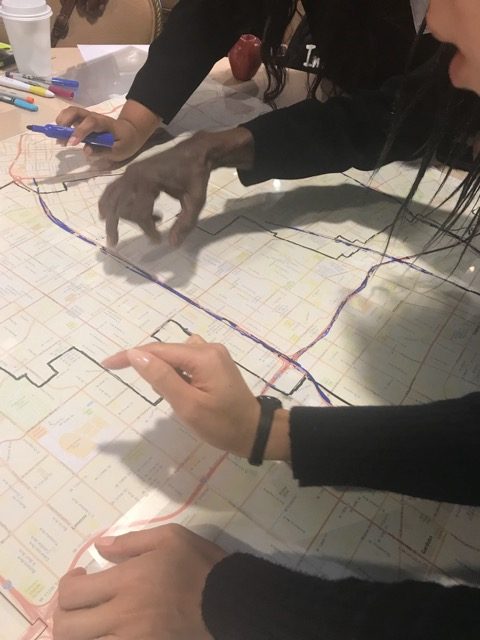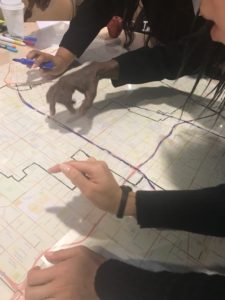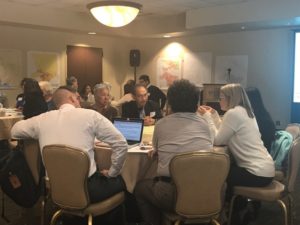
04 Oct Cities face “wicked” problems as we age

Breakout groups scoured maps of regions of Los Angeles, with an eye toward what’s friendly in those areas for older people-and what’s not
What makes a city friendly to people of all ages–particularly people who are over the age of 65? Last week, I spent an entire day sitting in a conference room at USC talking with a wide spectrum of fellow Angelenos about just that.
After all, with the population of older people set to triple in the coming years, it’s an issue that resonates for everyone, no matter what stage of life they’re in. (And if you don’t believe that, just imagine an exponential number of older drivers on the roads.)
About sixty of us were gathered together for this brainstorming session, from graduate students studying in a variety of disciplines, to civil servants and social service providers who work with older clientele, to bonafide seniors.
The event was the brainchild of gerontology professor Caroline Cicero, and professor Jennifer Swift of the Spatial Sciences Institute, who met at a session last year on campus convened to address another major issue in LA, homelessness. Students from social work and the school of public health are working with students from Cicero’s and Swift’s schools in an interdisciplinary semester-long course that tackles Los Angeles’ commitment to making this an “age-friendly” place.
But a close look at the domains by which friendliness is measured paints a bleak picture of this sprawling metropolis for people who are older.
Are there accessible outdoor spaces easy to navigate? Ample, easy-to-use transportation and affordable housing? Community and health services? Respect and social inclusion? All these are challenges here for people of any age, to be sure. But add mobility and other concerns for older people, and you’ve got a potentially toxic brew. Thus, these issues are considered “wicked,” meaning thorny to resolve.
What’s wicked, too, is the misunderstanding among even thoughtful, educated people about what it’s like to be older. There’s a sense that there’s a homogeneity–that anyone over a certain age is created equally. For example, the challenge of a 50-year old person facing age discrimination in a job search, who might lose their home without a full-time job, is quite different than someone age 75 who is retired from a long career and wants to find part-time work or become a mentor.

Pondering the domains of habitability for all of Los Angeles-older citizens in particular
Seated at my assigned table was an administrator representing a senior center for an affluent demographic and a public service lawyer/advocate for the poorest seniors. Someone of limited means facing eviction or the inability to reach a grocery store is grappling with a whole other set of concerns than a well-to-do retiree who may wish to launch a new business–or who has a spouse with a recent diagnosis of Alzheimer’s.
There’s also a sense that technology will fix/can fix everything–a lack of understanding that many people who are of a certain age today are not necssarily glued to their devices the way others are. Self-driving cars sound like a charming panacea, but what’s their reality of implementation, much less affordability? Ditto, Uber. It’s important to remember that there is not an app for everything, and that building a website of resources doesn’t actually “fix” things, either.
That the issues are wicked was clear, but that was offset by the fact that an intergenerational group of people sat together in a pointed dialogue. That can’t be anything but good.

